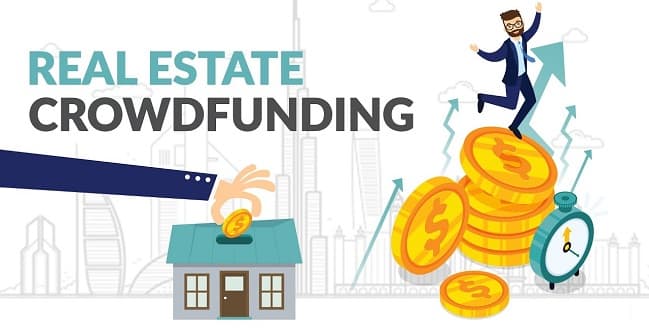Have you been wondering if real estate crowdfunding could help you earn some passive income? Well, yes. Real estate crowdfunding is popular to invest in real estate for passive income. It is an excellent opportunity for novice investors to get started on the path to creating a passive income. It enables investors to receive rental income and profits from the sale of their properties.
Real estate has always been a fantastic financial opportunity for investors. Real estate is the most secure and effective way to achieve financial freedom. Commercial real estate investing has been a popular strategy for investors to diversify their portfolios, especially given the low association between commercial real estate performance and the broader stock and bond markets. However, most individuals cannot purchase property due to the high cost. Historically, institutional investors–pension funds, university endowments, hedge funds–and wealthy individuals dominated real estate investing. They have the cash and relationships required to break into the industry and claim a piece of this trillion-dollar asset class. However, smaller investors had a few possibilities, including residential real estate and publicly traded REITs (real estate investment trusts). But the typical investor would find it difficult to add real estate to their portfolio. Investing in commercial real estate is not that simple, especially for people with less capital or without industry ties. However, the game has altered as a result of real estate crowdfunding. It is the intrinsic attractiveness of commercial real estate crowdfunding: people with little means may now contribute small sums to co-invest in institutional-quality commercial real estate with a group of other investors. And earn passive income.

Firstly, what is crowdfunding?
If you’re a business owner, you might be wondering, “What is crowdfunding, and how does it work?” You’ve heard stories about how someone raised thousands of rupees on Instagram for the treatment or surgery of an injured or ill dog. This collection gets sourced by crowdfunding.
Some crowdfunding examples include An 11-year-old girl in Hyderabad who has earned Rs. 6.2 lacs using community finance or crowdfunding to feed many disadvantaged individuals who lost their employment because of Covid-19 and the lockdown.
So, what exactly is crowdfunding meaning? Crowdfunding is a way of raising funds in which small donations from a group of people get accepted. Crowdfunding was a donation-based method. However, due to technological developments, real estate crowdfunding investing emerged.
Furthermore, crowdfunding is not a multifaceted opportunity to choose the platform that suits your idea. It is not a one-size-fits-all endeavor. Though there are hundreds, if not thousands, of different types of crowdfunding, many of them fit into one of four categories. The four types of crowdfunding are donation-based crowdfunding, reward-based crowdfunding, equity crowdfunding, and real estate crowdfunding.
And what is the scenario of crowdfunding in India?
Due to the success of western enterprises in the market, the notion of real estate crowdfunding has begun to gain traction in India. In India, peer-to-peer crowdfunding is already legal and regulated by the Reserve Bank of India. Because emerging technologies provide a wide range of connectivity, everyone in India may invest in real estate crowdfunding using their computers or mobile phones. As a result, several fintech businesses have sprung up to provide a sophisticated real estate crowdfunding platform that supports developers in obtaining funds for large real estate projects. Crowdfunding platforms like Assetmonk are simple, have transaction transparency, and precisely track returns. Assetmonk is an investment platform that provides real estate crowdfunding opportunities. Assetmonk, based in Hyderabad, focuses on real estate properties in Hyderabad, Bengaluru, and Chennai. It ensures bespoke asset-backed investment alternatives adapted for various financial items, with an estimated annual IRR of 21%.
Furthermore, SEBI is interested in regulating the whole real estate crowdfunding industry. And that includes an equity-based return on investment. SEBI has taken proactive efforts by publishing a consultation paper on the risks and advantages. It has also published the regulatory frameworks of other countries. The real estate crowdfunding environment in India is bound to be more organized and regulated in the future.
And what is real estate crowdfunding?
What exactly is crowdfunding real estate investing? Real-estate crowdfunding (also known as property crowdfunding) is a means of raising cash for real estate investments by enlisting the help of a group of investors and asking them to contribute a small sum of money to a project. It is a means of collecting funds that enables small real estate investors to fund major projects. Real estate crowdfunding allows a group of investors to pool their resources to support a specific real estate project. Individual investors may enter the market for significantly less than they would if they bought real estate on their own, and they should be able to receive passive income as a result.
You can find actual homes for sale in Olive Branch by using popular real estate websites such as eXp Realty. This website provide up-to-date information on homes for sale in Olive Branch and allow you to filter your search based on your preferences.
How does real estate crowdfunding work?
Real estate crowdfunding platforms allow investors to browse and select real estate projects they want to invest in. Once an investment is made, the investor becomes a shareholder in the project and is entitled to a share of the profits generated by the project.
But is real estate crowdfunding a good investment?
The section below highlights some of the advantages of real estate crowdfunding, which may help you decide whether this investment vehicle is right for you.
- Portfolio diversification: The opportunity to diversify your portfolio is one of the most visible benefits of real estate crowdfunding. By diversifying your portfolio, you essentially spread the risk associated with a single investment over many ones.
- Access: Real estate crowdfunding has enhanced the accessibility of real estate investing. Private real estate investments were only available to wealthy persons with the required cash and contacts. These are no longer barriers to entry. It is due to legislative developments and the rise of internet crowdfunding services.
- Passive Income: Investing in real estate crowdfunding provides a passive income source rather than a traditional real estate investment vehicle. It is another compelling characteristic. When you join in real estate crowdfunding, you invest with a third-party real estate developer who performs all the work. You trust the developer or operator to execute all necessary activities on time and within budget. Consequently, you will be relieved of the worry of property management. It frees up your time to focus on other aspects of your investing.
- Low investment: Because of the amount of money required for a standard real estate investment, you may have never been able to participate in real estate before. However, real estate crowdfunding allows you to become a real estate investor because of the low investment size restrictions. You don’t need lakhs and crores of rupees to invest in real estate, as was once required to buy a house. If you are new to real estate investing, a lower investment size allows you to “dip your toe in the water” or achieve greater diversification.
What is passive income?
Making money outside of your job by investing is an excellent strategy to secure financial security and cover costs. And what do we call that? Passive income. Passive income is a partially automated revenue stream. Some passive income sources like stock, mutual funds, or other equity-based vehicles require you to make an initial capital investment. After that, you can obtain an ownership interest in that investment, from which you earn dividends or other forms of regular income. The fact that you are not personally managing the investment makes this passive. However, if you’re searching for more means to create passive income, real estate provides options you could be interested in, like real estate crowdfunding.
And How can Real Estate Crowdfunding Help You Earn Passive Income?
Real Estate Crowdfunding can help you earn stable passive income from the real estate market without a massive initial commitment. It allows investors a lot of money without having to do any work in the process. As a result, investors may generate passive income more comfortably and inexpensively. Here are the top four reasons why crowdfunding is a better way to make passive income:
- No property maintenance: The investor in real estate crowdfunding does not own any physical property. The investor acts as a financier for the Realty Developers, who use the funds to run the project daily. As a result, the investors do not have to run errands to manage the renters or maintain and monitor the property.
- Steady profits: The Realty Developer offers reasonable guaranteed returns of 12 percent on average on monies invested. As a result, real estate crowdfunding generates a steady stream of passive income. Because the average length of real estate crowdfunding is 8 to 10 years, the consistent income flows can get reinvested in compounding assets to achieve a two-fold profit.
- Limited paperwork: Real estate crowdfunding investors are not actual investors in real estate property. Thus, it eliminates the need for rounds of meetings to purchase a property and complete the paperwork. Real estate crowdfunding allows investors to invest from the comfort of their own homes.
- No active participation: The advantage of real estate crowdfunding is that the investor does not always engage in the crowdfunding process. The crowdfunding platform, sponsors, managers, and trustees oversee the entire process, making it less stressful for investors. As a result, investors may receive passive income even while cruising in the Caribbean.
Santosh Kumar, the author behind IndiasStuffs.com, is passionate about sharing valuable insights on a variety of topics, including lifestyle, technology, and Indian culture.
Page Contents

